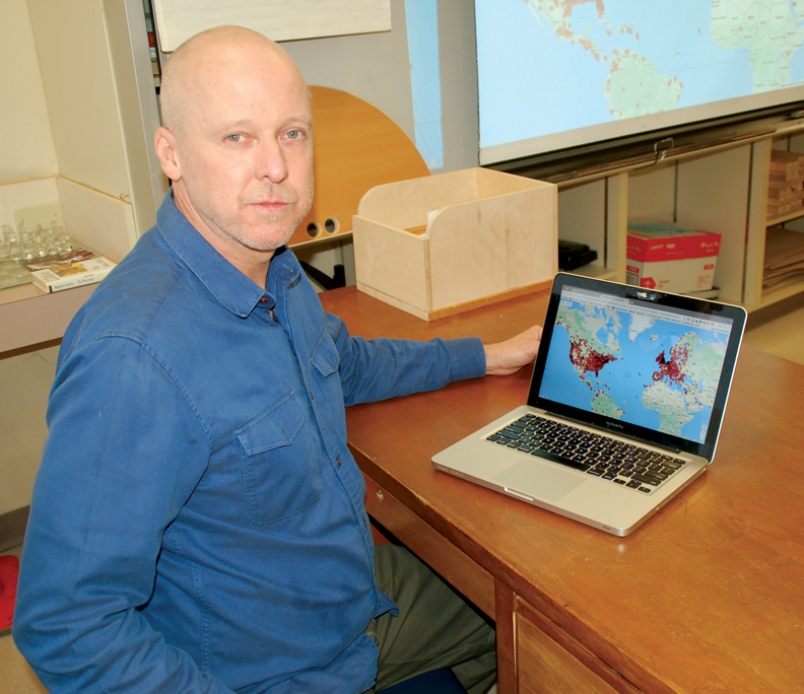“I had 6 wonderful years at Indiana University doing research as a graduate student, and I didn’t want to graduate.”
By Maria Anna van Driel, www.medium.com
Can’t you keep your eyes off those twinkling stars that shine so brightly in the night sky? Are you that glued to your telescope that they have to surgically remove you from it? If so, then the astronomy bug has bite you and directed you towards a scientific career in astronomy.
“Children are natural explorers”, Dr. Kafka explains in an interview with The Next Truth. They naturally follow the scientific method of theorizing, experimenting, revising their theories and, experimenting again and come up with a conclusion. Being an explorer seems to be part of who we naturally are.”

So, do you like to build things? Make things work? Write computer programs? Solve equations? “Boldly go where no-one has gone before”?
Well, there are astronomers who do all different things like these while asking the questions, ‘what are the building blocks?’, ‘what are the processes?’ and “what is our place in the universe?” Where do you want to look next?
Read the full article on the website of Medium.com
Women in Astronomy: Where We’ve Been and Where We’re Going!
An interview with Executive Officer & CEO at AAVSO and Astronomer, Dr. Stella Kafka.

Can’t you keep your eyes off those twinkling stars that shine so brightly in the night sky? Have you read all those books that take you on an incredibly and cool journey through the universe?
Does your bedroom look like a direct copy of our cosmic freezer and, are you that glued to your telescope that they have to surgically remove you from it?
If so, then you were most likely born to have a scientific career in astronomy.
Astronomy, needless to say that this is the scientific study of celestial objects such as stars, planets, comets, and galaxies and, phenomena that originate outside the Earth’s atmosphere such as the cosmic background radiation.
Historically, astronomy has included disciplines as diverse as astrometry, celestial navigation, observational astronomy, the making of calendars, and even, at one time, astrology. But, did you know that, since the 20th century, the field of professional astronomy has split into observational and theoretical branches?
I am your host Maria Anna van Driel and you’re listening to “The Next Truth; Where Science and Myth Meet”. This week I am speaking with Executive Officer & CEO at AAVSO, STEM promoter and Astronomer, Dr. Stella Kafka, and discus with her the fascinating science of Astronomy and, the importance and influence of female scientists.
[Top]Can we Locate the Source of a Mysterious and Blood Curdling Noise called, The HUM
An interview with ethnographic researcher and HUM expert, Dr. Glen MacPherson.

Do you ever hear a noise, not a bump in the night but, a mysterious, constant and very low frequency noise? If so, you may be one of an estimated 2% of the global population that can hear “The Hum”.
These strange noises, reported by many, can become that loud for your ears to pick it up as an odd ringing sound. Second, is nauseating. And thirdly, if it is really bad, it actually feels like your brain is being squeezed.
The Hum is the name given to an ominous and very mysterious deep-rumbling noise that can reportedly be heard by thousands of individuals across the globe.
The Hum, a very low-pitched rumbling sound, kind of like a diesel-engine truck idling in the distance, does not appear to be a single phenomenon. Different causes have been attributed, including local mechanical sources, often from industrial plants, as well as manifestations of tinnitus or other biological auditory effects.
But no matter how hard people search, no one has been able to locate the source of the sound, and it sounds like it’s coming from all directions equally.
I am your host Maria Anna van Driel and you’re listening to “The Next Truth; Where Science and Myth Meet”. This week I am speaking with ethnographic researcher, and high school teacher of physics, mathematics, psychology, general science, and biology, Dr. Glen MacPherson and discus with him what might be the source of one of the most mysterious and blood curdling noises people have heard in their lives…The HUM.
[Top]What Turns Your Hamburger Into…Poop?!
An interview with practicing Gastroenterologist and Hepatologist, Dr. Sameer Islam who was standing outside of his practice at the moment The Next Truth interviewed him.

Ridiculous as it might sound to some of you but, ‘poop’ has a history too. No, not this brown smelly stuff that you find after visiting the bathroom but the word itself.
According to Eric Partridge in his excellent book of word origins (Origins: A Short Etymological Dictionary of Modern English), “poop” comes from the Middle English word “poupen” or “popen”, and it originally meant “fart.” The word was based on the sound of a fart.
But what is it that makes us poop and fart this often? Why does it sometimes smell that bad and others times it seems as if it does not have a smell at all? And, how does the steak on our plate or the drinks we drink, being turned into this brown smelly stuff we call ‘poop’?
By the way, did you know that whale poop is used by microorganisms to photosynthesize and produce oxygen?
I am your host Maria Anna van Driel and you’re listening to “The Next Truth; Where Science and Myth Meet” and this week I am speaking with practicing gastroenterologist and hepatologist, Dr. Sameer Islam and take with him an astonishing journey through the sewers of the human body, our intestinal system. And see if we can answer this question, which valuable information does our poop hold about our health?
[Top]